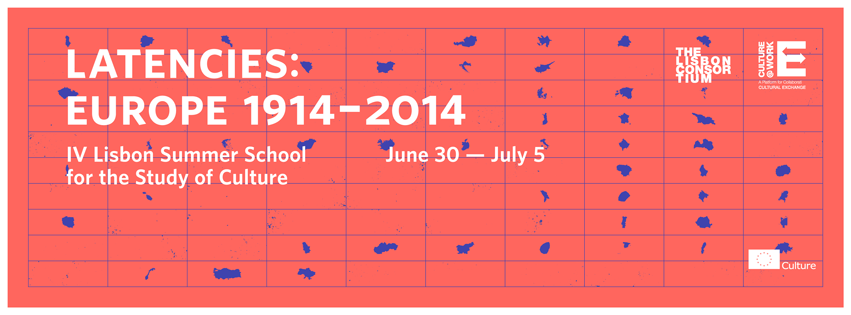
Latencies:
Europe 1914-2014
CULTURE@WORK project
June 30 – July 5, 2014
Over the past century, Europe has been a site of contradiction. Marked, on the one hand, by the utmost explosions of violence, it has also given rise to the most peaceful post-national political project in modern times. It has been a haven of peace and a locus of disorder and violence, giving vent to experimentation, transgression and creation, while preserving tradition and enforcing normativity.
Developed within the larger context of the European Project Culture@Work, the 2014 Lisbon Summer School for the Study of Culture addresses artistic latency in Europe. Latency periods are defined as states of transition pre-dating structured change and characterized by indefinition as well as what Freud considered a repression of desire and a return to normativity. These periods of cultural and artistic latency are often accompanied by social and political crisis or violence (Spanish Civil War, WWI and II, Cold War, Yugoslav Wars, austerity crisis, etc.) and despite the limitations of the context, they harbour the seeds of cultural change and revolution. In the contradictory relation of repression and creativity, it is particularly relevant to ask how does latency affect the partition of the sensible? How does a repressive context impact on artistic agency? How does art created as a reaction to the disruption of war and the destruction of life affect communal life?
The European Summer School in Cultural Studies is a network-based seminar for interdisciplinary research training in the fields of art and culture, organized by the the Lisbon Consortium, the Copenhagen Doctoral School of Cultural Studies, The Amsterdam School of Cultural Analysis, The International Graduate Centre for the Study of Culture at the University of Giessen, The London Consortium, École Doctorale Esthétique, sciences et technologies des arts, Université de Paris VIII, Institutum Studiorum Humanitatis Ljublana and The PhD programme in Humanities and the Arts at the University of Trondheim.
The Lisbon Consortium and the Project Culture@Work together with the PhDNet in Literary and Cultural Studies (University of Giessen, Catholic University of Portugal, University of Stockholm, University of Bergamo, University of Helsinki and University of Graz) are the 2014 organizers of the Lisbon Summer School / European Summer School in Cultural Studies and invite work from doctoral students and post-docs working in every field of the humanities and social sciences.
Suggested topics are, amongst others:
- Latency as a cultural concept;
- War and artistic latency;
- Art, repression and change;
- European crisis and cultural policies;
- Propaganda, censorship, and cultural production;
- Latency, transition, translation;
- Affect and crisis;
- Europe as latency.
Confirmed keynote speakers
- Martha Rosler (photographer)
- Hans Ulrich Gumbrecht (Stanford University)
- Samuel Weber (Northwestern University)
- Barbie Zelizer (University of Pennsylvania)
- Antonio Monegal (University Pompeu Fabra)
- Catherine Perret (Nanterre University, Paris X)
- Ansgar Nünning (University of Giessen)
- Knut Ove Eliassen (The Norwegian University of Science and Technology)
- José Miguel Sardica (Catholic University of Portugal)
Master classes
– Isabel Capeloa Gil (Catholic University of Portugal) & Frederik Tygstrup (University of Copenhagen)
– Alexandra Lopes (Catholic University of Portugal)
– PirjoLyytikäinen (University of Helsinki)
Organizing Committee
- Isabel Capeloa Gil
- Peter Hanenberg
- Alexandra Lopes
- Paulo de Campos Pinto
- Daniela Agostinho
The IV Lisbon Summer School is co-funded by the Culture programme of the European Union.
